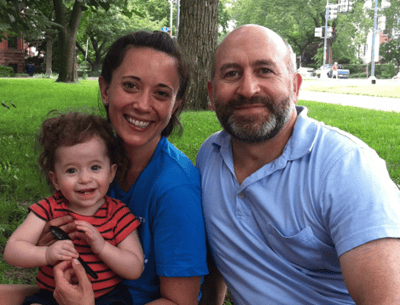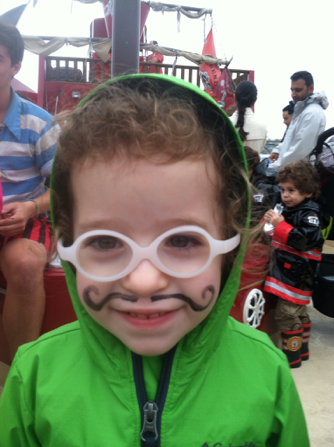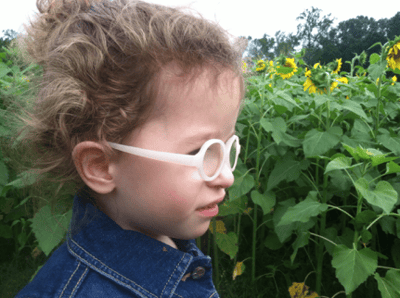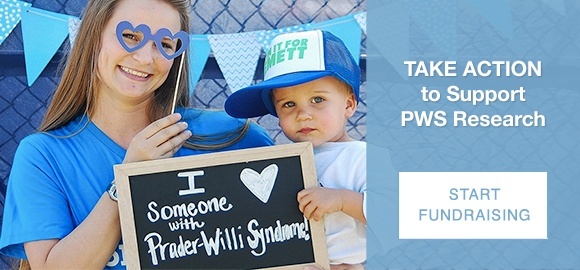A special contribution by guest blogger and One SMALL Step host Rachael Petterson
 Every night, for several weeks following my daughter Mae’s birth, I stayed up late reading medical journal articles and studies. I was determined to figure out why Mae did not cry, move her arms and legs, or open her eyes. The neonatal intensive care unit (NICU) doctors said that there might be something wrong with Mae, who was born two months early, but recommended we give her time.
Every night, for several weeks following my daughter Mae’s birth, I stayed up late reading medical journal articles and studies. I was determined to figure out why Mae did not cry, move her arms and legs, or open her eyes. The neonatal intensive care unit (NICU) doctors said that there might be something wrong with Mae, who was born two months early, but recommended we give her time.
The nurses said Mae was floppy. One told me that Mae was “special.” I walked into the NICU each morning with a pit in my stomach, fearful of what I might learn. My amateur scientific research made me feel like I was in control of something, even though logically I knew that the control I felt was an illusion. The day we had Mae transferred to a new hospital, a geneticist told me that she believed Mae had Prader-Willi Syndrome, or PWS. Several weeks later, tests confirmed the diagnosis.
Looking back, I can't remember in sequential order what I did, felt, or thought in the weeks after we found out Mae has PWS. I do remember moments and even feelings – brief snapshots from what was an emotional and scary time. I felt a sense of relief after we found out Mae had PWS because I no longer had to deal with the uncertainty of an unknown diagnosis. However, a PWS diagnosis brought with it uncertainties of its own, including a wide array of symptoms and medical problems that would, or could, affect our daughter in unknown ways. I remember calling my friend Marianna late one night, while sitting in a ball in the corner of our upstairs balcony, and crying to her because I could no longer picture what our future, our life, might look like. The fear, mixed with sadness, was overwhelming.
At times, I avoided talking to people, including old friends. I just didn't feel like talking. I didn't initially post photographs of Mae on Facebook because I didn't know what to say. Do I say nothing and pretend like everything was fine? I worried about what might happen to Mae years, even decades, in the future. Would she have to live in a home? Would she have friends? Would she have to eat her lunch alone each day? Would other children be kind to her? I worried about my ability to parent Mae – a child with special needs, a child who was going to have deal with issues that I never imagined, and a child whose life might not fit the trajectory of what I, at the time, considered “normal.”
From Fear to Hopeful Acceptance
 I lived in a state of perpetual anxiety and fear about Mae’s quality of life, PWS, and the future of my family until, over time, I no longer lived there. Several things helped me move from a place of fear to the place where I mostly live now, which is a place of hopeful acceptance punctuated by occasional moments of worry and doubt:
I lived in a state of perpetual anxiety and fear about Mae’s quality of life, PWS, and the future of my family until, over time, I no longer lived there. Several things helped me move from a place of fear to the place where I mostly live now, which is a place of hopeful acceptance punctuated by occasional moments of worry and doubt:
First, my perspective changed. During one of my Internet research sessions, I stumbled upon an essay by Emily Perl Kingsley titled Welcome to Holland. In the essay, she compares parenting to embarking on a long vacation to Italy and the excitement and expectations leading up to the trip. She goes on to write how, when parents have special needs children, these parents unexpectedly end up in Holland rather than Italy. And, even though Holland does not have many of the same attractions as Italy, Holland is no less enchanting and beautiful.
After reading this essay, I realized that Mae’s life might be different than I expected, but it will be no less meaningful. Mae will find success, love, and joy. She will find purpose and happiness. Mae might not find them in the places our society typically believes they are found, and that is okay. Of course, I realized, Mae’s life will have meaning. Mae will struggle, will achieve, will fight, and will live like any other child.
As I came to this realization, I also grieved the loss of dreams and expectations I didn't even know I had. I still grieve sometimes. I grieve for the hardships that Mae faces that many children don't face. I also grieve for other children who face greater hardship than Mae. Having a child with a genetic syndrome and special needs makes one acutely aware of the pain, struggles, and fears of other parents who are raising children with chronic medical conditions and disabilities. I have twinges of sadness when I see other children Mae’s age bounding up stairs or eating dessert or hear them speaking in full sentences.
At the same time, my heart aches when I walk through the halls of Children’s National Hospital with Mae and see other children who may not ever walk, run, or talk. Despite the moments of sadness that sometimes grip me, I know that Mae’s life, and our life with her, may be different than if Mae did not have PWS, but it will still be full, joyful, sometimes difficult, and always meaningful.
She Taught Me She's Going To Be Okay
 Second, Mae taught me that she is going to be okay. Over the past three years, I've watched Mae change, grow, and become her own little person. Many of the things I worried about did not come to fruition or were easier to deal with than I anticipated. As a baby, Mae began drinking from a bottle, stopped using her feeding tube, and sat up on her own. She began rolling and pulling up. She smiled, laughed, and even cried. At two, she walked. Now, at three, she runs and can climb some stairs on her own. Mae has never met a stranger. She is friendly, inclusive, social, and dramatic. She makes people feel good, and she makes them feel loved. Mae regularly kisses her baby sister, Mira, on the forehead and asks about her first thing every morning.
Second, Mae taught me that she is going to be okay. Over the past three years, I've watched Mae change, grow, and become her own little person. Many of the things I worried about did not come to fruition or were easier to deal with than I anticipated. As a baby, Mae began drinking from a bottle, stopped using her feeding tube, and sat up on her own. She began rolling and pulling up. She smiled, laughed, and even cried. At two, she walked. Now, at three, she runs and can climb some stairs on her own. Mae has never met a stranger. She is friendly, inclusive, social, and dramatic. She makes people feel good, and she makes them feel loved. Mae regularly kisses her baby sister, Mira, on the forehead and asks about her first thing every morning.
Mae’s favorite animal is a panther. She dances in the living room with her dad and changes her baby dolls’ diapers. She loves riding on her papa’s shoulders with her crown on, pretending she is Max causing a rumpus in Where the Wild Things Are. She enjoys skyping with her Lola, visiting her Nana and watching Disney movies, and collecting latex gloves at each doctor’s visit. Mae is Mae. She is sweet, and often stubborn. She is like any other child. She is simply the best part of my life.
A Community of Hope
Third, in addition to our family and friend support networks, my husband and I found a community of parents, families, and individuals living with PWS that not only welcomed us with open arms, but also gave us hope. My friend Allison, whose son has PWS, has given me recommendations for doctors Mae should see and when to see them. She was the first parent I spoke to about Mae, and after our first conversation, I felt stronger and better able to handle Mae’s diagnosis. I have regular lunches with my friend Mary, whose son also has PWS, and in her I have found someone with whom I can share my fears and also celebrate the accomplishments of our children.
Through the Foundation for Prader-Willi Research, my husband and I regularly learn about advances that we are hopeful will help Mae to live an independent life. It's comforting and inspiring to know there are hundreds of families, along with their friends and families, who are raising money for PWS research, participating in studies, and researching to better the lives of not only their children with PWS, but our Mae.
I don't know where life will take Mae. As much as I would sometimes like to see the future, I rest in knowing that Mae’s life is a beautiful one, full of promise.
Do you have a story of hope to share with others about your experiences with PWS? Send it to us!








